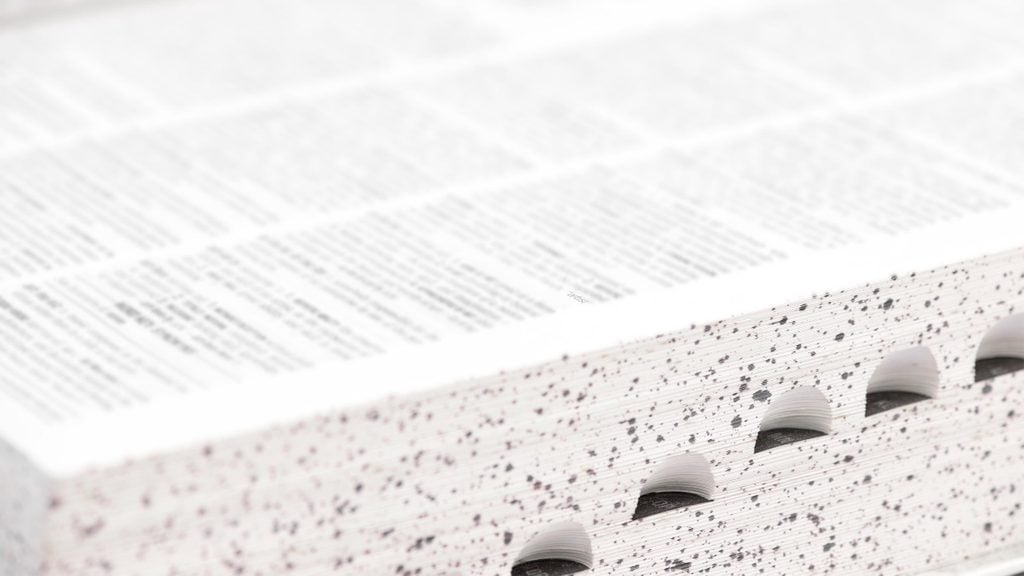Here’s How Words Get Removed from the Dictionary
Updated: Nov. 21, 2023

The dictionary isn’t forever. Here’s the lowdown on what happens to a word when its popularity starts to wane.
You can’t call someone a frutescent snollygoster anymore—at least not officially. Those words have been deleted from the dictionary, so you’ll have to come up with alternate terms to describe a shrubby, unscrupulous politician. And those words aren’t alone. Each year, a slew of old-timey words don’t make the cut to the next edition. Here’s how the process of deleting a word from the dictionary works and why it happens in the first place. Ever tried reading the whole dictionary? Here’s how long it would take you.
Why are words deleted from the dictionary?
The dictionary is a steadily enlarging volume, with thousands of new words being added each year. That’s because the English language constantly evolves and changes. Some new words arise from emerging and expanding disciplines. Others come from pop culture, which gives rise to slang that sometimes goes mainstream. Definitions also change and shift, so common words gain new meanings and nuances. On the flip side, there are also words that become obsolete. As a result, words get removed from the dictionary, though this doesn’t happen nearly as frequently as they’re added. Check out the process of adding a new word to the dictionary.
How many words are removed from the dictionary each year?
Very few words actually get removed from the dictionary. Instead, they’ll stay in but get categorized in a different way. The unabridged Collins English Dictionary uses labels like “obsolete,” “archaic,” or “old-fashioned” to designate the kind of words that are no longer in circulation. And the Oxford English Dictionary uses labels like “Now hist.” and “Obs.” to indicate that a word is historical or obsolete. There are plenty of bygone words that are no longer in use, but they’ll still show up in various dictionaries. Historians and scholars may need to know the origins and definitions of old, obscure words while doing research, so that’s why some out-of-date words remain. Believe it or not, some dictionaries also have “fake” entries—here’s why.
Who decides which words to delete?
Lexicographers, aka dictionary editors, decide which words make it into the dictionary—and also which ones are ready for deletion. While adding a word to the dictionary is a rigorous process, it’s even more difficult for a word to get deleted. Lexicographers maintain and study vast language databases to keep up-to-date on the words in circulation across various mediums. Most words that are marked for deletion will remain in online dictionaries (or will be removed from one dictionary but remain in others) even after they’re cut from print editions. Sometimes even lexicographers make mistakes. Check out how “dord” and 8 other words (that aren’t actually words) ended up in the dictionary by accident.
How do words get removed from the dictionary?
The Oxford English Dictionary covers the English language over the last 1,000 years, and it’s considered definitive and authoritative. However, there are many dictionaries that are reliable and trustworthy, and each has its own process for additions and removals. The American Heritage Dictionary, for example, uses the year 1755 as the cut-off year to indicate the difference between words that are obsolete versus archaic. What’s the difference? It defines an archaic word as one with “sporadic” print evidence of its use after 1755, and an obsolete word as one with “little or no” evidence of use since then. These are often the types of words that won’t make it into the print editions of dictionaries. Every time there’s a new print edition, inevitably some words will have to be cut so that it stays relevant and doesn’t become too unwieldy. Check out these 10 words that are almost extinct.
What are some recently deleted words?
Some words recently hit the chopping block in the Merriam-Webster Collegiate Dictionary—meaning they’re no longer included in the print edition. These include Vitamin G, snollygoster, hodad, frutescent, and sternforemost. Each of these terms has the necessary attribute of just not being useful or used anymore. Vitamin G used to be the term for what’s now known as riboflavin. Hodad comes from the 1960s and basically means a surfer poseur. While every era features these types of people who pretend to be who they’re not, this is an example of a term that fell from popular use. Sternforemost is no longer necessary to describe a ship moving backward; it’s an old nautical term from the 1800s. Frutescent, an adjective to describe being shrub-like, was also removed. And an unscrupulous politician used to be known as a snollygoster. Check out that word and others from the first dictionary that no longer exist.
How do dictionary additions and deletions reflect social changes?
The dictionary is the foundation of language, but that foundation reflects the perspective of those who have written it over the years. As a result, note scholars, the dictionary isn’t neutral. A 2019 petition with 30,000 signatures calls for the Oxford English Dictionary to remove sexist language and definitions, especially those entries under the word “woman.” In some dictionaries and on some websites, synonyms for woman include words like “bitch, piece, bit, mare, baggage, wench, petticoat, frail, and biddy.”
Sources
- Quartz: “The complex process that dictionaries use to decide which words are obsolete”
- ThoughtCo.: “An Introduction to Obsolete Words”
- The Atlantic: “How to Edit a Dictionary”
- Tech Times: “Happy Birthday Noah Webster! Here are 9 words removed from Merriam-Webster’s Collegiate Dictionary”
- The Guardian: “Sexism in dictionaries: why are ‘hussy, baggage and filly’ still used to describe a woman?”
- USA Today: “Oxford Dictionary’s synonyms for ‘woman’ are sexist. 30,000 petition to change it”
- Good Morning America:”Is the dictionary sexist? Petition calls for Oxford English Dictionary to remove sexist terms for women”
